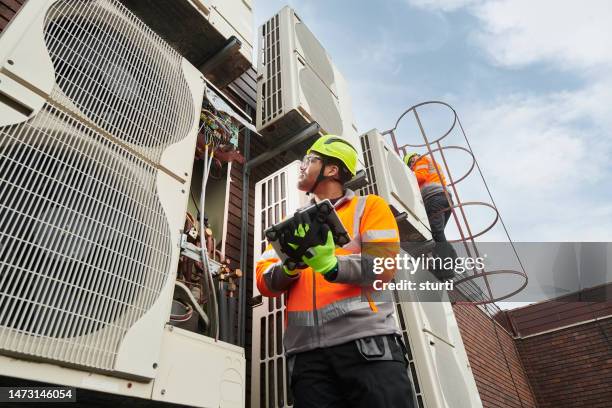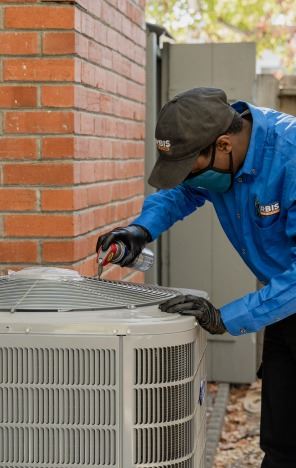How to Know It's Time for a furnace replacement
How to Know It's Time for a furnace replacement
Blog Article
Just How a Heatpump and Furnace Work With Each Other to Maximize Your Home's Heating Performance
Understanding how a warmth pump and heating system work together is necessary for homeowners seeking efficient home heating services. Each system has its staminas, offering a balanced approach to home comfort. The warmth pump stands out in moderate temperatures, while the heater provides fast heat during severe cold. This harmony not just minimizes energy prices yet also enhances the life-span of both home appliances. What variables affect this collaboration, and just how can homeowners maximize their advantages?
Recognizing Warm Pumps: How They Work
Several individuals might be unknown with their inner operations, warmth pumps play a necessary duty in modern heating systems. These tools run by moving heat from one area to an additional, making use of the concepts of thermodynamics. In cooler months, a heat pump removes warmth from the outdoors air, ground, or water, and transfers it indoors to heat the space. Alternatively, during warmer months, it can turn around the process, acting as an a/c by eliminating heat from inside to the outside.Heat pumps include an evaporator, condenser, compressor, and expansion valve. The refrigerant within the system soaks up warm as it vaporizes at low temperature levels and stress. The compressor then raises the stress and temperature level of the cooling agent, enabling it to release warm as it condenses. This reliable process can considerably minimize energy usage contrasted to standard heating approaches, making warm pumps a sustainable choice for climate control in homes.
The Duty of Heating Systems in Home Home Heating
Furnaces play a necessary duty in home heating by offering a reliable resource of heat throughout the chillier months. They operate by creating warmth through burning or electrical resistance, dispersing it throughout the home via air ducts or radiant systems. The efficiency of a heating system is typically measured by its Yearly Fuel Application Effectiveness (AFUE) rating, which suggests how properly the system converts fuel right into heat.Furnaces can make use of different power sources, including all-natural gas, oil, power, or gas, allowing house owners to select the most ideal alternative for their requirements. Unlike warm pumps, which may struggle in extreme cool, furnaces keep consistent efficiency, ensuring that interior temperatures stay comfortable no matter of outside problems. Additionally, contemporary heaters typically come geared up with innovative technology, such as variable-speed blowers and wise thermostats, enhancing their efficiency and responsiveness. This flexibility makes heaters a critical component in all-inclusive home heating methods.

Benefits of Making Use Of Both Systems Together
Integrating the staminas of both heaters and warm pumps can cause a more reliable and efficient home heating option. Making use of both systems permits property owners to make use of the heat pump's energy performance during milder temperature levels while counting on the furnace for even more severe cold problems. This dual method can significantly reduce power costs, as warm pumps eat less electricity than standard home heating methods when temperature levels are moderate.Additionally, using both systems together can boost convenience levels in the home. Heatpump can give consistent, even home heating, while heating systems can promptly elevate ambient temperatures when needed. The assimilation of both systems can expand the lifespan of devices by lowering wear and tear on each system, as they share the work. Inevitably, house owners can appreciate a balanced, affordable heating remedy that changes seamlessly to differing weather, making certain a cozy and inviting home throughout the cold weather.
Exactly How Warmth Pumps and Furnaces Enhance Each Various Other
When homeowners integrate warm pumps and heaters, they produce a complementary heating unit that maximizes effectiveness and convenience. Heatpump operate by transferring heat from the outdoors air or ground, making them highly reliable in modest environments. They excel throughout milder temperatures, providing cost-effective heating. Alternatively, heaters produce heat via burning or electric resistance, supplying strong, immediate heat during extreme chilly conditions.The combination of these two systems enables dynamic modifications based upon temperature fluctuations. During warmer months or milder winter season days, the heatpump can take the lead, conserving energy and lowering prices. As temperatures decline, the furnace can seamlessly involve, making certain constant heat throughout the home. This harmony not just enhances power use but also boosts the life expectancy of both systems, as each unit operates within its perfect performance range. Together, they develop a balanced setting that adapts to differing environment demands.
Enhancing Effectiveness: Tips for Homeowners
House owners can boost their heating efficiency via a number of useful methods. Establishing a routine maintenance schedule, integrating smart thermostat modern technology, and implementing reliable insulation and securing solutions are vital steps. These actions not only boost comfort however additionally minimize energy prices.
Normal Upkeep Arrange
To assure maximum home heating effectiveness, developing a routine maintenance routine is vital for any kind of home. House owners ought to prioritize routine assessments of both warmth pumps and furnaces to determine peak efficiency. This consists of altering air filters each to three months, as clogged up filters can considerably minimize efficiency. In addition, organizing expert maintenance a minimum of yearly allows professionals to identify and resolve potential issues prior to they rise. Home owners should additionally cleanse the heatpump's exterior system to stop debris accumulation that can prevent air flow. By adhering to a routine maintenance schedule, homeowners not only enhance their furnace' performance but also extend their lifespan, resulting in higher convenience and minimized power expenses throughout the colder months.
Smart Thermostat Combination
Incorporating a wise thermostat right into a home furnace can significantly boost energy efficiency, specifically as it permits for accurate control over temperature level setups. These devices can discover the home owner's routine and choices, automatically adjusting the temperature to enhance convenience while lessening energy use. For circumstances, they can reduce home heating throughout times when the home is empty, minimizing unnecessary intake. Several smart thermostats also offer real-time energy usage data, enabling homeowners to make informed choices about their heating practices. In addition, remote gain access to through mobile phone applications allows customers to adjust setups from anywhere, making certain the home is warm upon return. Overall, clever thermostat combination not just improves comfort yet considerably contributes to energy cost savings and effectiveness.
Insulation and Sealing Solutions
Smart thermostats play an important role in power efficiency, but their effectiveness can be greatly improved by appropriate insulation and securing solutions. Homeowners ought to focus on protecting floorings, wall surfaces, and attic rooms to decrease warm loss. Top notch insulation products, such as spray foam or fiberglass, can considerably boost thermal resistance. Furthermore, sealing spaces around air ducts, home windows, and doors stops cool air infiltration and warm getaway. Weatherstripping and caulking are efficient methods for dealing with these leaks - ductless mini splits. Normal assessments for air leakages, together with using blower door examinations, can aid identify issue locations. By buying insulation and securing, home owners can optimize the efficiency of their heater, inevitably bring about minimized power usage and lower energy bills
Usual Misconceptions Regarding Warm Pumps and Furnaces
What misconceptions surround heatpump and furnaces? Many individuals mistakenly think that warm pumps are inadequate in colder environments. In truth, modern-day warmth pumps are developed to run effectively even in reduced temperature levels, offering trusted heating throughout winter. One more usual he has a good point myth is that heating systems are constantly extra efficient than heatpump. This depends on the certain energy resources and effectiveness rankings of the units in question. Some might likewise assume that using both systems concurrently is unneeded, however as a matter of fact, this combination can maximize home heating performance, especially during extreme weather. Additionally, people commonly presume that warmth pumps require consistent upkeep, when truthfully, they have comparable maintenance requires to traditional heating systems. By unmasking these misconceptions, property owners can make even more enlightened decisions regarding their heating alternatives, ultimately causing enhanced comfort and energy efficiency in their homes.
Upkeep Factors To Consider for Combined Solutions

Frequently Asked Concerns
Can Warmth Pumps Job Properly in Extremely Cold Climates?
Warm pumps can struggle in very cold environments because of minimized effectiveness and warm extraction limitations. Developments in innovation have led to models made for better efficiency in such problems, boosting their practicality in severe environments.
Just How Lengthy Do Heat Pumps and Furnaces Commonly Last?
Heat pumps commonly last 15 to two decades, while heating systems have a lifespan of 15 to three decades. Regular upkeep can prolong their durability, making certain effective operation and minimizing the demand for premature replacements.

What Is the Average Cost of Installing Both Systems?
The ordinary cost of mounting both a heatpump and a heater generally ranges in between $5,000 to $10,000 - furnace replacement. Factors affecting this cost include system size, setup intricacy, and local labor prices
Exist Tax Obligation Incentives for Making Use Of Energy-Efficient Heating Equipments?
Numerous home owners inquire regarding tax rewards for energy-efficient heater. Numerous federal and state programs often supply refunds or credits, motivating the adoption of lasting innovations to decrease power usage and advertise ecological obligation.
Exactly how Do I Pick the Right Dimension Heatpump and Heating System?
Choosing the appropriate size heatpump and furnace entails determining the home's square video, considering insulation high quality, and assessing regional environment. Consulting a professional can guarantee perfect system performance and energy efficiency based upon specific needs. furnace replacement. Understanding how a warm pump and furnace work with each other is essential for homeowners seeking reliable home heating solutions. In colder months, a heat pump removes warm from the outside air, ground, or water, and transfers it inside your home to heat the ductless mini splits living space. When home owners integrate warm pumps and furnaces, they develop a corresponding heating system that takes full advantage of effectiveness and comfort. Warm pumps run by moving heat from the outside air or ground, making them very reliable in moderate climates. Warmth pumps can have a hard time in incredibly cold climates due to decreased effectiveness and warmth removal limitations
Report this page